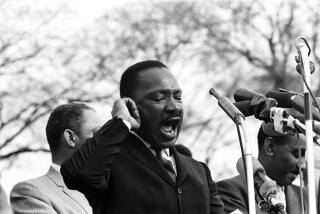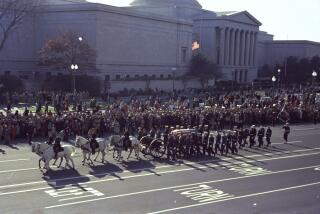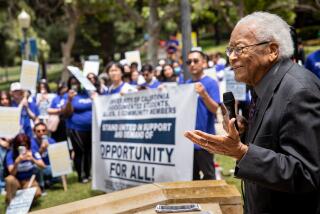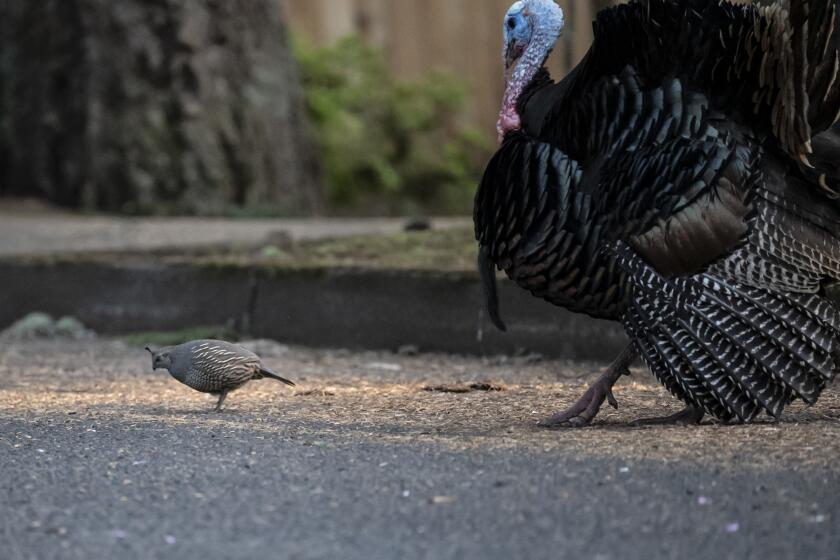Op-Ed: Martin Luther King’s death tore America apart. We still can’t reckon with African American demands for justice
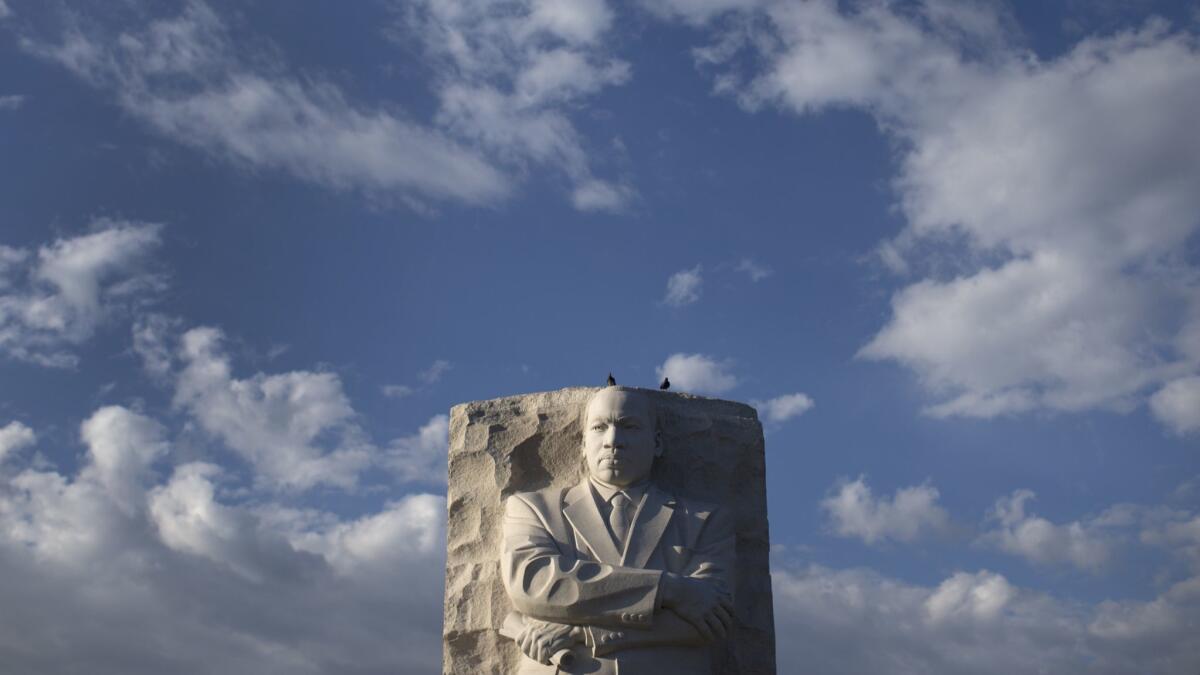
Because Martin Luther King Jr. now stands as an exalted hero of American history, we tend to assume that his assassination 50 years ago was experienced as a national tragedy. Yet in the days and weeks after his death on April 4, 1968, Americans not only mourned and grieved but also seethed and raged.
President Lyndon Johnson designated April 7, Palm Sunday that year, as a national day of mourning. On April 9, 120 million people watched King’s funeral on television. But Americans were not unified by a collective grief. Some whites were incredulous at the president’s proclamation and marveled that ministers would deliver eulogies for a man they considered a communist agitator; others even celebrated King’s death.
Riots decimated parts of Washington, Chicago and other cities. Many whites were angered and frightened by the violent eruptions more than they were beset by the loss of King.
There were millions of Americans, black and white, who peacefully honored the slain civil rights leader and committed themselves to King’s dream of a “beloved community” of racial justice and interracial harmony. But that dream was very much in doubt even before King’s death; his assassination helped to extinguish it. This was a corrosive time, a time when the divisions in American society — political, social, and most of all racial — burst to the fore, when the nation threatened to crack in two. It was a time not unlike our own.
::
Now, as then, a segment of white America views all forms of black protest as unacceptable and unpatriotic. There may not be a straight line that runs from Martin Luther King Jr., the prophet of nonviolence, to Colin Kaepernick, the former San Francisco 49ers quarterback who knelt during the national anthem, and others who have joined the Black Lives Matter movement. But the white hatred directed at King and these modern-day civil rights protesters some five decades later is remarkably similar.
King’s detractors claimed that he was inflammatory, and that he actually created violence. When Bull Connor unleashed his attack dogs on black protesters in Birmingham, or when Jim Clark’s posse fractured the skulls of marchers in Selma, whites blamed King and his followers for helping to produce that violence. So went the argument.
Many white Americans continue to view any criticism of the nation as disloyalty, especially if the critic is African American.
King attracted the most widespread scorn for his antiwar activism. In a speech at the Beverly Hilton Hotel in February 1967, King insisted that he opposed the Vietnam War “because I love America” and “because I am disappointed with America.” In April 1967, in a sermon at Riverside Church in New York City, King called America “the greatest purveyor of violence in the world today.” He feared that his nation was approaching “spiritual death.” Newspaper editors rebuked King; political leaders denounced him; the death threats intensified.
In King’s last campaign, he traveled to Memphis early in 1968 to assist striking sanitation workers — 1,300 black men who toiled in degrading conditions for meager wages. On March 28, 1968, King led a march during which some of the protesters behind him turned violent. King’s critics thought this clinched their argument. Sen. Robert Byrd of West Virginia called King a “self-seeking rabble-rouser” who “undoubtedly encouraged” the violence in Memphis. Rep. Dan Kuykendall of Tennessee accused King of “agitating destruction, violence, and hatred.” The criticism continued even after King’s murder days later. Upon hearing of the assassination, Sen. Strom Thurmond of South Carolina decried King as “an outside agitator, bent on stirring people up, making everyone dissatisfied.”
Many white Americans thought King had received his just deserts. “The leaders of the government pay homage to a rabble rousing, riotous insurgent,” lamented Shelbyville, Tenn., resident Richard Brantley in a letter to the Nashville Tennessean. “I am sick to my soul.”
::
In our own time, African American protesters are similarly loathed. When Kaepernick devised his national anthem protest in 2016, he consulted with veterans precisely because he wished to express himself in a way that would not be perceived as an attack on the nation or military. He wanted to raise awareness about racial injustice, particularly the killing of black men by police officers. But he was despised and lambasted, and ultimately run out of the National Football League. In September 2017, President Trump reignited the controversy when he advised NFL owners to fire any “son of a bitch” who took a knee during “The Star Spangled Banner.”
Many white Americans continue to view any criticism of the nation as disloyalty, especially if the critic is African American. Debating Tomi Lahren, the Fox News contributor who gained fame for her caustic criticism of Kaepernick, “The Daily Show’s” Trevor Noah wondered how African Americans ought to exercise their 1st Amendment rights, if not through peaceful protests like Kaepernick’s. “Here’s a black man in America who says, ‘I don’t know how to get a message across. If I march in the streets, people say I’m a thug. If I go out and I protest people say it’s a riot.’… What’s the right way for a black person to get attention in America?” Lahren dodged the question.
King’s legacy had, by 2016, become thoroughly sanitized. Many white Americans embraced him as a voice for colorblindness, and conveniently forgot about his own confrontational acts of civil disobedience.
Conservatives even invoked King in their denunciations of the Black Lives Matter movement. Bill O’Reilly charged that “Dr. King would not participate in a Black Lives Matter protest.” Mike Huckabee claimed that King would be “appalled by the notion that we’re elevating some lives above others.” Clemson football coach Dabo Swinney recommended that Black Lives Matter protesters heed King’s shining example: “I think the answer to our problems is exactly what they were for Martin Luther King when he changed the world. Love, peace, education, tolerance of others, Jesus.”
All of these critics missed something fundamental. King was a man who criticized his country, who was condemned as unpatriotic in his own day, and who paralyzed American cities with massive street demonstrations.
::
After King’s death in 1968, African Americans took to the streets — some in violent revolt and others in peaceful and interracial marches. In turn, politicians such as George Wallace and Richard Nixon promised a law-and-order crackdown. Nixon exploited white voters’ racial anger en route to the White House.
In 2018, this story seems hauntingly familiar. Unarmed black men have been gunned down in our streets, yet many white Americans remain unmoved by those acts of racial violence. Their response has not been to call for justice, but to support a president who has empowered and emboldened white supremacists.
While King tried to bring the races together during his life, his death illuminated the depths of white racism just as it accelerated black militancy and helped to break the races further apart. We now stand in the wake of a vicious backlash against our first black president and confront a world in which black lives remain uniquely threatened. It is five decades since King’s murder, but the same white rage tears at our social fabric.
Jason Sokol is a history professor at the University of New Hampshire and author of “The Heavens Might Crack: The Death and Legacy of Martin Luther King Jr.”
Follow the Opinion section on Twitter @latimesopinionand Facebook
More to Read
A cure for the common opinion
Get thought-provoking perspectives with our weekly newsletter.
You may occasionally receive promotional content from the Los Angeles Times.
